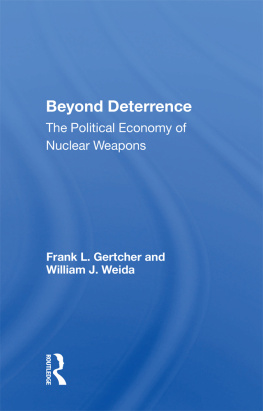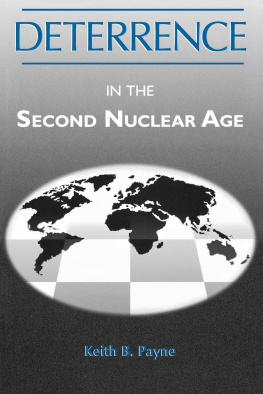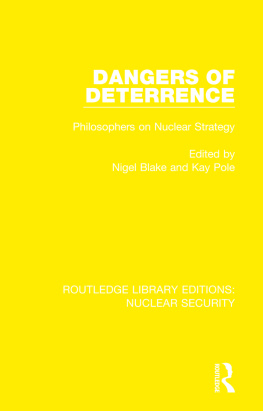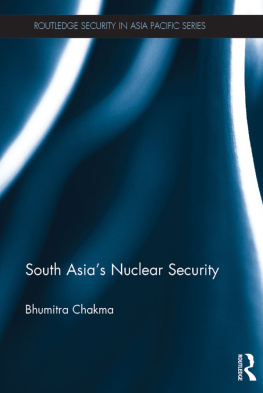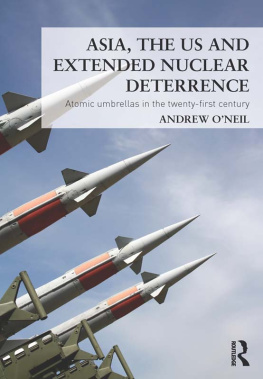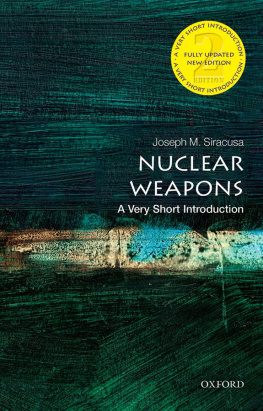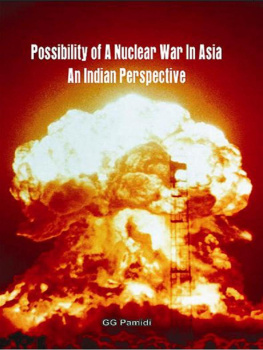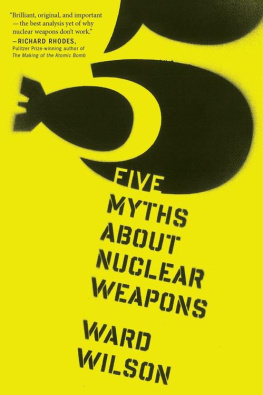Beyond Deterrence
Beyond Deterrence
The Political Economy of Nuclear Weapons
Frank L. Gertcher
and William J. Weida
First published 1990 by Westview Press, Inc.
Published 2018 by Routledge
52 Vanderbilt Avenue, New York, NY 10017
2 Park Square, Milton Park, Abingdon, Oxon OX14 4RN
Routledge is an imprint of the Taylor & Francis Group, an informa business
Copyright 1990 Taylor & Francis
All rights reserved. No part of this book may be reprinted or reproduced or utilised in any form or by any electronic, mechanical, or other means, now known or hereafter invented, including photocopying and recording, or in any information storage or retrieval system, without permission in writing from the publishers.
Notice:
Product or corporate names may be trademarks or registered trademarks, and are used only for identification and explanation without intent to infringe.
Libray of Congress Cataloging-in-Publication Data
Gertcher, Frank L.
Beyond deterrence: the political economy of nuclear weapons/Frank
L. Gertche, William J. Weida.
p. cm.
Includes bibliographical references.
ISBN 0-8133-0477-6
1. United StatesMilitary policy. 2. Nuclear weaponsUnited
States. 3. Nuclear weaponsEconomic aspectsUnited States.
4. Military policy. 5. Nuclear weapons. 6. Nuclear weapons
Economic aspects. 7. United StatesArmed ForcesAppropriations
and expenditures. I. Weida. William J. II. Title.
UA23.G554 1990
355.02'17dc20 89-29126
CIP
ISBN 13: 978-0-367-00724-9 (hbk)
Beyond Deterrence explains the role of military, political and economic incentives in perpetuating the continued growth of worldwide nuclear arsenals. The book begins by identifying nuclear threats as perceived by both U.S. and Soviet military planners. It then discusses the economic and political incentives that result in a continuing demand for additional nuclear weapon production.
This book also provides a comprehensive, worldwide inventory of nuclear arms and a discussion of nuclear production facilities to define the dimensions of the current supply of nuclear weapons. It then shows how this supply has proliferated to create potential nuclear powers among several less developed nations and how the supply of usable weapons may be altered by the development of defenses to counter certain nuclear threats.
In addition, the book explores a wide range of internal and external factors that have created the demand for nuclear weapons. Internal factors cover a spectrum of motivations from local and regional economic stimulation to international considerations involving both resource allocation and military and political commitments. External motivations arising from competition to develop modern ballistic missile, air defense, and command and control systems are discussed as further elements that may alter the demand for new or additional nuclear weapons. Finally, the book outlines the likely effects of economic constraints and arms control agreements on the ability of nuclear powers to reduce the number of nuclear weapons.
Beyond Deterrence is designed for serious students of defense policy and economics, for defense planners and for people who wish to increase their understanding of the political economy of nuclear weapon production and proliferation. Students may wish to seek additional details in the references cited in the notes at the end of each chapter. The more casual reader may prefer to spend less time on the technical details in favor of a more general review of the analyses and the conclusions. In either case, Beyond Deterrence provides the reader with a bridge between the theoretical world of economic efficiency and the politically motivated world of nuclear defense planning.
Frank L. Gertcher
William J. Weida
We are grateful to the many individuals who aided in the preparation of Beyond Deterrence. We especially want to thank Peter W. Kracht and Susan L. McEachern at Westview Press for their encouragement and administrative guidance, and our colleagues within R&D Associates and within the Department of Economics and Business, Colorado College, for their help in obtaining source materials and their insightful reviews and comments. Finally, we want to thank our wives, Judy and Betty, for their encouragement and for listening patiently over the past two years to periodic lectures on the nature of the nuclear threat and the prospects for deterrence as we approach the twenty-first century.
Although every effort was made to eliminate errors in the book, we recognize that some may have slipped through. For these we take full responsibility, and we encourage readers to correspond with us concerning corrections and suggestions for improvements.
F.L.G.
W.J.W.
Part One
Nuclear Dilemmas
1
Introduction
In a political economy context, this book explains the results of decisions by the governments of the United States, the Soviet Union, and other nations to develop modern nuclear weapons and defense systems. It begins by identifying nuclear threats as perceived by military planners. It continues with discussions of strategic defenses, the demand for nuclear weapons, budgets, opportunity costs, spinoffs, domestic and international economic aspects, arms control, and prospects for the future.
The discussions throughout this book deal with the possibility of nuclear war. A close examination of the continuing development of nuclear weapons and delivery systems in the Soviet union, the United States, and other nations reveals that military preparations for nuclear war are ceaseless, and these preparations appear insensitive to the terrible consequences that would result if such a war occurred.
Yet in our over 27 years of association with the U.S. Department of Defense, we have not found any decision maker who would relish the thought of using nuclear weapons to demolish a perceived enemy. Like most civilians, most military decision makers appear genuinely appalled at the thought of what could happen if the present state of nuclear deterrence fails. It is likely that similar feelings of restraint and concern exist among people in the governments of other major nations that have nuclear weapons.
The incentives that perpetuate the growth of nuclear arsenals are not altogether military. They include numerous political and economic factors and substantial constituencies that benefit from nuclear weapons development, deployment, and maintenance.
The role of military, political and economic incentives in perpetuating the continued growth of worldwide nuclear arsenals provides the theme for this book. Perhaps, if enough readers develop an understanding of these incentives, they may collectively find ways to break the pattern of nuclear weapons accumulation, and by democratic processes and negotiations, enhance the prospects for the continued existence of our civilization.
This introductory chapter establishes the framework for subsequent chapters by providing an overview of the current military balance between the East, led by the Soviet Onion, and the West, led by the United States. It also outlines the problem of nuclear weapons proliferation, the potential for nuclear terrorism, and current U.S. and Soviet nuclear defense capabilities. Throughout the chapter, important military, political, and economic incentives are introduced that have influenced the development and the extent of worldwide nuclear arsenals.


